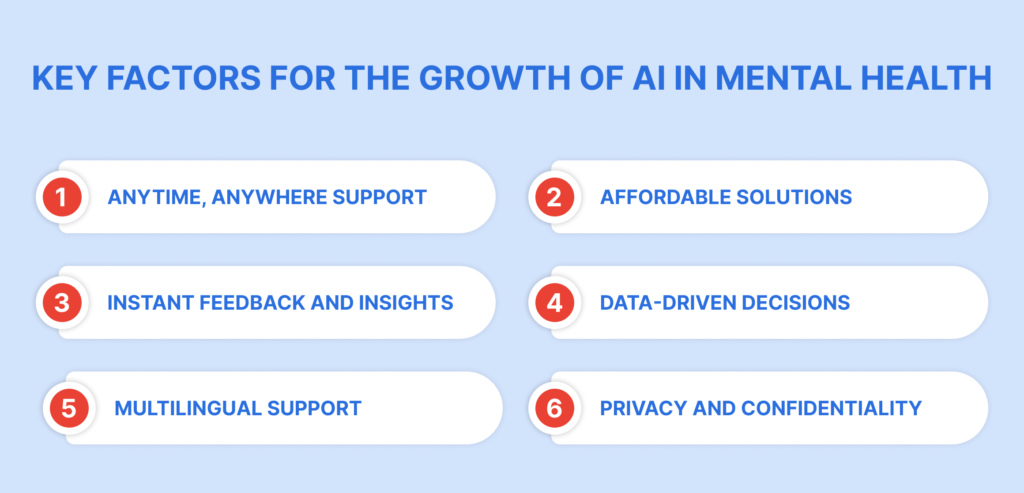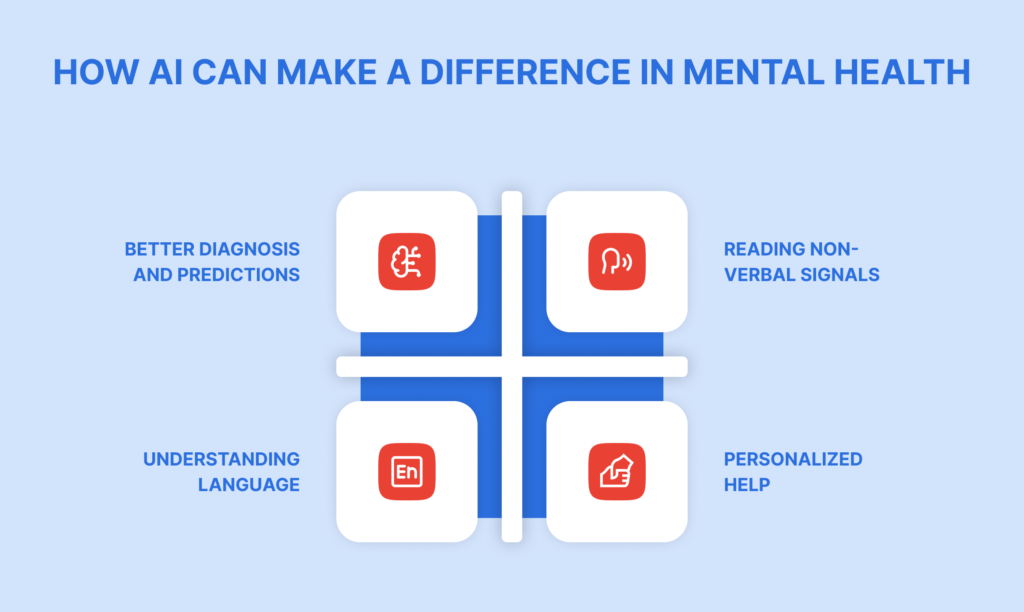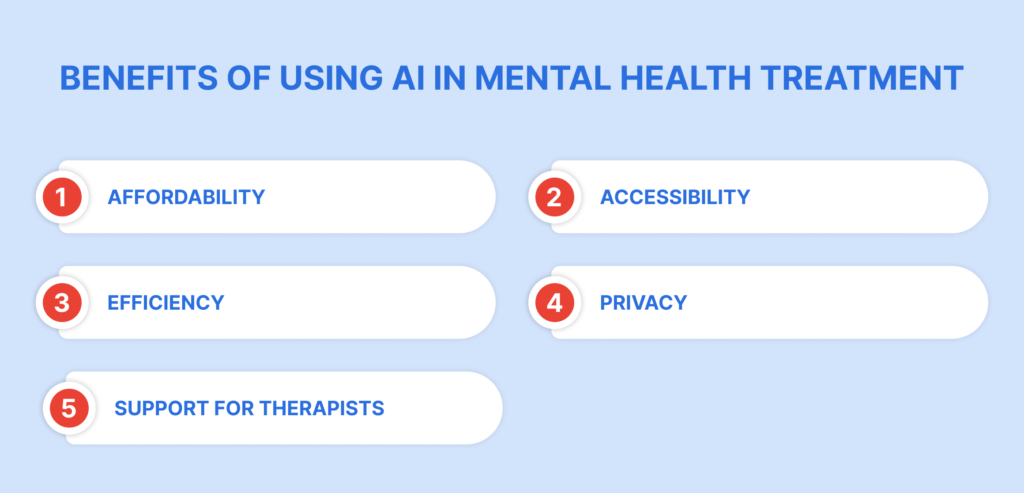Imagine a world where getting mental health support is as easy as opening an app on your phone. In 2024, this is becoming a reality thanks to the rise of artificial intelligence (AI) in mental health care. Picture yourself sitting comfortably at home, using a mental health app that knows exactly what you need. With just a few taps, you can access therapy sessions, track your mood, or even chat with a virtual therapist. This is the new way we’re connecting with mental health resources highlighting the future of AI in mental health to make support more accessible and personalized for everyone.
Recent studies show that nearly 1 in 5 adults experience mental illness in any given year. That’s about 51.5 million people in the U.S. alone! Unfortunately, many of them struggle to find the help they need. This is where AI comes in, making support more accessible and personalized.
AI technologies are designed to analyze how we speak and behave. Research indicates that AI can detect emotions in speech with an accuracy of over 90%. This means that apps can provide real-time feedback and guidance based on how you’re feeling at that moment. Imagine a situation where, after a tough day, you can open an app that not only understands your mood but also offers support strategies designed just for you.
Whether you’re a mental health professional looking to enhance your practice or someone seeking better support, it’s essential to understand how technology is transforming the field. At our software development company, we specialize in creating innovative AI solutions that make mental health care more effective, accessible, and personalized.
Join us as we explore how these advancements are shaping the future of mental health for everyone.
Key Factors for the Growth of AI in Mental Health
Before we explore how artificial intelligence is changing mental health care, let’s look at what’s behind the growing mental health crisis.
Many challenges are pushing healthcare professionals to find new and better ways to diagnose and treat mental health problems. Understanding these factors helps explain why AI is becoming an important tool in mental health support today.

Mental Health Statistics—The Crisis We’re Facing
Mental health issues are rising around the world. Currently, about 10% of the global population is affected, with nearly 15% of teenagers experiencing mental health conditions. Tragically, suicide ranks as the fourth leading cause of death among people aged 15 to 29.
Mental illness not only impacts individuals but also has significant economic effects, with estimates suggesting they could cost the global economy around $16 trillion from 2010 to 2030.
The reasons behind the increase in depression and anxiety are complex. Many factors contribute, including the pressures of modern life and the lasting effects of the COVID-19 pandemic, which has worsened existing mental health challenges. However, as we look to the future of AI in mental health, some experts believe that the growing awareness of mental health issues has led more people to seek help.
The number of adults in the U.S. receiving inpatient or outpatient care and counseling has been steadily increasing over the past 20 years. However, access to treatment remains a major issue. According to Mental Health America’s 2023 report, nearly 30 million U.S. adults with a mental disorder still do not receive any treatment.
Can AI Help with Mental Health, and How?
AI is making a significant impact in mental health care by providing innovative solutions that enhance diagnosis, treatment, and support. These technologies are not just tools; they are helping to bridge the gap in mental health services, making care more accessible and personalized.
Let’s explore some of the exciting possibilities of how AI can help with mental health:

1) Better Diagnosis and Predictions
Machine learning (ML) and Deep learning (DL) help doctors identify mental health issues more accurately and predict how patients might respond to treatment.
2) Reading Non-Verbal Signals
Computer vision can analyze images and understand non-verbal signals like facial expressions, gestures and eye movements, giving more insight into how a person is feeling.
3) Understanding Language
Natural language processing (NLP) allows computers to understand and respond to spoken or written words. This technology powers chatbots that can have conversations and help with keeping medical records.
4) Personalized Help
Generative AI can provide ongoing, customized support through virtual assistants or chatbots that engage users in conversation and suggest therapy plans based on their individual needs.
Although machine learning (ML) and computer vision are already used in many industries, using AI in mental health is still new. Unlike areas like radiology, where AI can sometimes do better than humans, mental health care depends a lot on human connection and empathy. Many mental health professionals worry that AI might not be able to provide the understanding and compassion that are crucial in therapy.
However, many people find talking to chatbots comforting. Users often feel they can open up to an AI without fear of being judged, and they appreciate the quick responses to their questions.
Research shows that using computer-based Cognitive Behavioral Therapy (CBT) through apps can be just as effective, or even more effective, than regular in-person therapy.
Overall, while AI won’t replace human therapists, it can be a valuable tool in enhancing mental health care.
Examples of How AI is Transforming Mental Health Care
AI is making significant improvements in mental health care, offering innovative solutions that enhance support and treatment. From virtual assistants to personalized therapy plans, these advancements are changing how individuals access and engage with mental health resources. Here are some examples of how AI is transforming mental health care:
1) Analyzes Patient Data to Identify Mental Health Risks
AI is now being used to analyze different types of patient information, like health records, blood tests, brain scans, questionnaires, and even social media posts. By using techniques like machine learning and natural language processing, AI can spot signs of mental health issues such as stress, sadness, or suicidal thoughts.
One interesting example is a tool created to help access soldiers coming back from service. This system looks at how they speak, their body language and their social interactions to find signs of stress or distress. The goal is to spot those who may need extra mental health support.
AI is making it easier to understand and address mental health issues, helping more people get the care they need.
2) AI in Self-Assessment and Therapy Sessions
AI is changing how people can assess their mental health and receive therapy. This includes chatbots that use natural language processing (NPL) and generative AI to offer advice, track user’s responses and evaluate mental health symptoms. These chatbots can work alone or connect users with a certified psychiatrist online.
Some popular AI-powered virtual therapists include Woebot, Replika, Wysa, Ellie, Elomia and Tess.
- Chatbot Tess:
For example, Tess provides personalized therapy using proven methods like Cognitive-Behavioral Therapy (CBT).
It communicates through text messages and relies on words to understand feelings.
Researchers tested Tess with students and found that those who chatted with it every day for two weeks had fewer mental health symptoms compared to those who used it less often. - Chatbot Ellie:
Another chatbot, Ellie, goes further by understanding not just words but also body language and facial expressions.
This helps Ellie figure out how someone is feeling and respond in a way that reduces stress and anxiety.
AI also includes mental health tracking tools that work with wearable devices. These devices monitor things like heart rate and blood pressure to show changes in physical and mental health. One such tool is BioBase, which helps companies prevent burnout among employees. It uses AI to analyze data from wearables and has been shown to reduce sick days by up to 31%.
Another exciting example is XAIA (eXtended-Reality Artificially Intelligent Ally), which combines virtual reality with AI to provide timely mental health support. This program uses a virtual avatar to guide users through therapy sessions, making it feel like they are talking to a real therapist.
3) Improving Patient Engagement with AI
- Help manage mental health and make it easy to book appointments, find directions, and get health info.
- Send reminders for medications and explain why following treatment plans is important.
- Identify at-risk patients and send them helpful messages to encourage care.
- AI helps healthcare organizations engage with patients and enhance their care experience.
4) Creating Personalized Treatment Plans with AI
- Tailored Therapies:
AI uses patient data to create customized treatment plans for different mental health conditions. - Data Analysis:
Machine learning analyzes information like medical history, genetics, activity levels and treatment results. - Brain Imaging Study:
At the University of California, AI analyzed brain scans to develop personalized treatments for children with schizophrenia. - Pattern Recognition:
The AI system identifies the best treatments by recognizing patterns in brain images and previous patient responses. - Network Pattern Recognition:
This AI analyzes patients’ answers to help mental health professionals make better treatment decisions. - Better Outcomes:
AI leads to more effective and personalized treatment plans for patients.
5) Streamlining Therapists’ Workflows with AI
- Reducing Workload:
Mental health professionals can’t always rely on old tools or other doctors for patient data. - AI Platforms:
AI systems can automatically gather information from different hospital systems and create reports on patient progress and conditions. - Example:
OPTT is an AI platform that helps therapists improve clinic efficiency, potentially increasing access to mental health care by up to 400%. - Daily Tasks:
AI simplifies everyday tasks like filling out forms, sorting electronic health records (EHRs), and processing clinical documents. - Focus on Care:
Overall, AI helps therapists spend more time on patient care and less on administrative work.
Benefits of Using AI in Mental Health Treatment
AI is revolutionizing mental health care by providing affordable and accessible options for support. It helps both patients and therapists by making treatment more efficient and comfortable. Here are some key benefits of using AI in mental health treatment:

- Affordability:
AI apps allow access to help anytime, anywhere, often at little or no cost compared to traditional therapy. - Accessibility:
AI breaks down barriers like staff shortages, especially in rural areas, helping over 100 million people in the US. - Efficiency:
AI can detect symptoms of conditions like depression and anxiety with high accuracy, leading to quicker support for patients. - Privacy:
Many people find it easier to share personal issues with AI, reducing the fear of judgment. - Support for Therapists:
AI helps clinicians use their time better by processing data quickly and monitoring patients for early signs of trouble.
Current AI Trends in Mental Health
Interest in AI for mental health is growing fast! A recent study showed that more people in the US are searching for information about AI and mental health in 2023. This rising awareness is encouraging companies to create more mental health apps using AI technology.
Here are some key trends shaping the future of mental health care:
1) Growing Public Interest
Recent studies indicate a significant rise in online searches for “AI and Mental Health.” This growing curiosity reflects an increasing awareness of AI’s potential to enhance mental health treatment. As more people seek information, companies are responding by developing new AI-powered mental health applications.
2) Increased Funding for Mental Health Tech
Despite economic challenges like inflation and supply chain disruptions, mental health technology remains the most funded area in digital health. In 2021, mental health tech companies raised a remarkable $5.5 billion globally, a 139% increase from the previous year. The pandemic has intensified the demand for digital solutions that improve mental health care delivery.
3) Significant Startups and Funding Rounds
In 2022, various startups made headlines by securing substantial funding.
- Wysa:
An AI chatbot that raised $20 million. - BlueSkeye:
Focused on early diagnosis, received £3.4 million. - Upheal:
A smart notebook for therapists that secured €1.068 million. - clare&me:
An AI mental health companion that raised €1 million.
4) Development of Emotionally Intelligent AI
Researchers are working on creating more emotionally intelligent AI therapists. These advanced systems aim to understand and respond to patients’ emotional needs better. Emerging AI applications are expected to utilize predictive capabilities to enhance mental health assessments and treatments.
5) Innovative Research and Applications
Cutting-edge research is paving the way for AI solutions in mental health:
- Suicide Risk Prediction:
Researchers at Medical Center developed a machine learning algorithm that uses hospital admission data to predict suicide risk with 80% accuracy. - Early Diagnosis of Parkinson’s Disease:
The University of Florida is testing an AI platform designed to make accurate diagnoses for patients showing early symptoms of Parkinson’s. - Personalized Treatment Plans:
There is ongoing research to create AI tools that use explainable AI and deep learning to offer customized treatment plans for children with schizophrenia.
Conclusion
AI is changing the way we approach mental health care for the better. The new therapies being developed are making treatment more effective and easier for people to access. By using AI, we can create a future where mental health support is personalized and available to everyone.
Adopting these technologies will help us address mental health challenges more effectively, leading to happier and healthier lives for individuals and communities. We are at the beginning of this journey, and the opportunity for positive change is great.
By investing in AI and mental health research, we can look forward to a future where mental health care is effective, caring and accessible to all, ultimately leading to healthier and happier communities.
